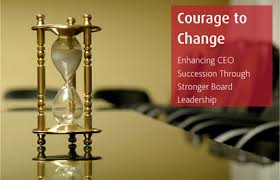The Impact of a New CEO

Businesses have to evolve in order to respond to the market, consumer demands, societal pressures and stakeholder expectations. Companies grow and pivot in two ways – organically or through acquisition or sales of parts. These changes have a significant impact on the business, its operations, its risk profile and eventually its success or failure to adapt.
We often hear about the significant impact of a new CEO. In this era, which is overblown in my humble opinion, of Rockstar CEOs, the impact of a new and popular CEO can be positive to the overall success of a company.
But the converse can be true as well – what happens when a poor CEO takes over the reins and has a negative impact on the business?
This has occurred and is a risk unto itself. A new CEO can bring about unpopular change, push the company in a new direction, embrace serious and unjustified risks, and bring down overall employee morale.
Leadership requires emotional intelligence and tactical skills needed to motivate and direct an organization in successful direction. I have seen too many companies where a new CEO has a negative impact and immediately undermines the company’s existing culture, all to the detriment of the company’s financial performance and overall morale.

Compliance is not immune from this impact – a corporate ethics and compliance program can face serious challenges when a new CEO comes in and wants to put his or her stamp on the company’s culture. In several cases, such change may occur for change’s sale, not for any reasonable and legitimate business necessity. On the other hand, a fresh look at a company’s culture and compliance program can bring about new ideas and improvements. It is a risk that an organization takes when it brings in new leadership, and the risk is significant in replacing a CEO.
Companies with forethought plan on a succession model to minimize the risk of transition, but these days, with CEO searches motivated by finding the magic bullet to elevate earnings rapidly, companies are often making risky choices and bring in an unknown quantity to assume the leadership position. It is a delicate balance between admitting the need for change and then going about implementing such change.
Corporate boards seek safety in minimizing risk but have come under increasing pressure to take risks in seeking an advantage by hiring a new and popular CEO. In the same way that companies suffer from short-term thinking, an unrealistic set of expectations causing a company to hire a new superstar CEO may result in disaster.

Meanwhile, for the backbone of corporate functions – finance, sales, legal, compliance and others – they are forced to suffer the ups and downs of leadership changes – some work and some do not. But adapting to leadership changes can be difficult and downright harmful depending on the vision and commitment of the new CEO.
All too often, we observe CEOs who seek to make their mark by implementing significant changes without proper strategic calculation – the market often reacts to imprudent moves by CEOs, and we have seen such results on a number of occasions. There is nothing more harmful to a company than a failed Rockstar CEO, one who fails to live up to expectations, engages in misconduct, and frustrates normal operations in a business by seeking to dominate the company’s operations with an over-sized ego.














